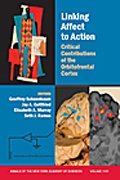
Linking affect to action: critical contributions of the obitofrontal cortex
Schoenbaum, Geoffrey
Gottfried, Jay A.
Murray, Elizabeth A.
Ramus, Seth J.
This volume provides an account of the critical contribution the orbitofrontal cortex makes across the limbic, striatal, and prefrontal networks and discusses the implications of orbitofrontal dysfunction in addiction, aging, and psychiatric disorders. INDICE: Preface: Geoffrey Schoenbaum, Jay Gottfried, Elisabeth Murray, andSeth Ramus. Keynote: Revaluing the Orbital Prefrontal Cortex: R. J. Dolan. Part I: Defining the Orbitofrontal Cortex Across Species 1. Specialized Elementsof Orbitofrontal Cortex in Primates: Helen Barbas. 2. The Orbitofrontal Cortex: Novelty, Deviation from Expectation, and Memory: Michael Petrides. 3. Definition of the Orbital Cortex in Relation to Specific Connections with Limbic and Visceral Structures, and Other Cortical Regions: Joseph L. Price. 4. Orbitofrontal Cortex Connections Supporting a Role in Emotion: Nancy L. Rempel-Clower. Part II: The Orbitofrontal Cortex and Chemosensory Function 5. Perspectives on Olfactory Processing, Conscious Perception, and Orbitofrontal Cortex: Gordon M. Shepherd. 6. What Can an Orbitofrontal Cortex-Endowed Animal Do with Smells?: Jay A. Gottfried. 7. Taste in the Medial Orbitofrontal Cortex of the Macaque: Thomas C. Pritchard, Gary J. Schwartz, and Thomas R. Scott. 8. The Role of the Human Orbital Frontal Cortex in Taste and Flavor Processing: Dana M. Small, Genevieve Bender, Maria G Veldhuizen, Kristin Rudenga, Danielle Nachtigal,and Jennifer Felsted. Part III: The Orbitofrontal Cortex and Associative Learning 9. The Role of Orbitofrontal Cortex in Sensory-Specific Encoding of Associations in Pavlovian and Instrumental Conditioning: Andrew R. Delamater. 10. The Contribution of Orbitofrontal Cortex to Action Selection: Sean B. Ostlund and Bernard W. Balleine. 11. Neural Encoding in the Orbitofrontal Cortex Related to Goal-Directed Behavior: Tomoyuki Furuyashiki, and Michela Gallagher. 12. Interactions between the Orbitofrontal Cortex and Hippocampal Memory System during the Storage of Long-Term Memory: Seth J Ramus, Jena B Davis, Rachel J. Donahue, Claire B Discenza, and Alissa A Waite. 13. Orbitofrontal Cortex and theComputation of Economic Value: Camillo Padoa-Schioppa. 14. Lights, Camembert,Action! The Role of Human Orbitofrontal Cortex in Encoding Stimuli, Rewards and Choices: John P. O'Doherty. Part IV: Revealing the Orbitofrontal Cortex through the Amygdala and Striatum 15. Orbitofrontal Cortex and Amygdala Contributions to Affect and Action in Primates: Elisabeth A. Murray and Alicia Izquierdo. 16. Synergistic and Regulatory Effects of Orbitofrontal Cortex on Amygdala-Dependent Appetitive Behavior: A.C. Roberts, Y. Reekie, and K. Braesicke. 17. Reconciling the Roles of Orbitofrontal Cortex in Reversal Learning and the Encoding of Outcome Expectancies: Geoffrey Schoenbaum, Michael P Saddoris, and Thomas A. Stalnaker. 18. Flexible Neural Representations of Value in the PrimateBrain: C. Daniel Salzman, Joseph J. Paton, Marina A. Belova, Sara E. Morrison. 19. The Contribution of the Prelimbic Cortex, Orbitofrontal Cortex and Dorsomedial Striatum to Behavioral Flexibility: Michael E. Ragozzino. 20. Guiding Actions Toward Rewards: A Comparison of Reward-Contingent Neuronal Activity in Monkey Orbitofrontal Cortex and Ventral Striatum: Janine M. Simmons, Sabrina Ravel, Munetaka Shidara, Barry J. Richmond. Part V: Orbitofrontal Function within the Prefrontal Cortex 21. Orbital versus Dorsolateral Prefrontal Cortex: Anatomical Insights into Content vs. Process Differentiation Models of the Prefrontal Cortex: David H. Zald. 22. Difficulty Overcoming Learned Non-reward During Reversal Learning in Rats with Ibotenic Acid Lesions of Orbital Prefrontal Cortex: David Scott Tait and Verity J. Brown. 23. The Role of Orbitofrontal Cortex in Decision Making: A Component Process Account: Lesley K. Fellows. 24. Neuronal Activity Related to Anticipated Reward in Frontal Cortex: Does It Represent Value or Reflect Motivation?: Matthew R. Roesch and Carl R. Olson. 25. Neuronal Mechanisms in Prefrontal Cortex Underlying Adaptive Choice Behavior: Jonathan David Wallis. Part VI: The Orbitofrontal Cortex, Mental Health, and Aging 26. Dysfunctions of Medial and Lateral Orbitofrontal Cortex in Psychopathy: R. J. R. Blair. 27. The Orbitofrontal Cortex, Real-World Decision-Making, and Normal Aging: Natalie L. Denburg, Catherine A. Cole, Michael Hernandez, Torricia H. Yamada, Daniel Tranel, Antoine Bechara, and Robert B. Wallace. 28. Orbitofrontal Cortex Function and Structure in Depression: Wayne C. Drevets. 29. Early Symptoms of Frontotemporal Dementia Provide Insights into Orbitofrontal Cortex Function and Social Behavior: Indre V. Viskontas, Katherine L. Possin, and Bruce L. Miller. 30. The Role of the Orbitofrontal Cortex in Anxiety Disorders: Mohammed R. Milad and Scott L. Rauch. 31. Vulnerability of the Orbitofrontal Cortex to Age-Associated Structural and Functional Brain Changes: Susan M. Resnick, Melissa Lamar, and Ira Driscoll. Part VII: The Orbitofrontal Cortexand Addiction 32. The Orbital Prefrontal Cortex and Drug Addiction in Animalsand Humans: Barry J. Everitt, Daniel M. Hutcheson, Karen D. Ersche, Yann Pelloux, Jeff Dalley, and Trevor W. Robbins. 33. Neural Correlates of Inflexible Behavior in the Orbitofrontal-Amygdalar Circuit after Cocaine Exposure: Thomas A. Stalnaker, Matthew R. Roesch, Donna J. Calu, Kathryn A. Burke, Teghpal Singh, and Geoffrey Schoenbaum. 34. Orbitofrontal Cortex and Cognitive-Motivational Impairments in Psychostimulant Addiction: Evidence from Experiments in the Non-Human Primate: Peter Olausson, J. David Jentsch, Dilja D. Krueger, Natalie C. Tronson, Angus C. Nairn, and Jane R. Taylor. 35. The Orbitofrontal Cortex, Impulsivity and Addiction: Probing Orbitofrontal Dysfunction at the Neural, Neurochemical, and Molecular level: Catharine A. Winstanley. Abstracts of PosterPresentations.
- ISBN: 978-1-57331-683-5
- Editorial: New York Academy of Science
- Encuadernacion: Rústica
- Páginas: 400
- Fecha Publicación: 02/01/2008
- Nº Volúmenes: 1
- Idioma: Inglés
